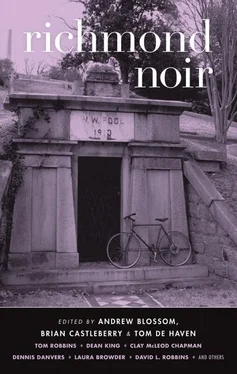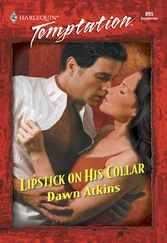X. Atkins - Richmond Noir
Здесь есть возможность читать онлайн «X. Atkins - Richmond Noir» весь текст электронной книги совершенно бесплатно (целиком полную версию без сокращений). В некоторых случаях можно слушать аудио, скачать через торрент в формате fb2 и присутствует краткое содержание. Город: New York, Год выпуска: 2010, ISBN: 2010, Издательство: Akashic Books, Жанр: Детектив, на английском языке. Описание произведения, (предисловие) а так же отзывы посетителей доступны на портале библиотеки ЛибКат.
- Название:Richmond Noir
- Автор:
- Издательство:Akashic Books
- Жанр:
- Год:2010
- Город:New York
- ISBN:978-1-933354-98-9
- Рейтинг книги:4 / 5. Голосов: 1
-
Избранное:Добавить в избранное
- Отзывы:
-
Ваша оценка:
- 80
- 1
- 2
- 3
- 4
- 5
Richmond Noir: краткое содержание, описание и аннотация
Предлагаем к чтению аннотацию, описание, краткое содержание или предисловие (зависит от того, что написал сам автор книги «Richmond Noir»). Если вы не нашли необходимую информацию о книге — напишите в комментариях, мы постараемся отыскать её.
Richmond Noir — читать онлайн бесплатно полную книгу (весь текст) целиком
Ниже представлен текст книги, разбитый по страницам. Система сохранения места последней прочитанной страницы, позволяет с удобством читать онлайн бесплатно книгу «Richmond Noir», без необходимости каждый раз заново искать на чём Вы остановились. Поставьте закладку, и сможете в любой момент перейти на страницу, на которой закончили чтение.
Интервал:
Закладка:
Staring into the mirror, with its gilded frame, she was utterly confused by her appearance. A housewife all cried out in the suburbs. With no mascara, the tears did little to disturb her face. But they made her eyes raw and red and searching. Were her tears for Africa? Or were they for that feeling, deep in her belly, a sad expectancy that any day now she would find lipstick on her husband’s collar, or that he would rush through the door and make straight for the shower, with no explanation save a liar’s grin?
She had not looked at herself for a very long time. She viewed her face shyly at first, then with immodest intent. Meredith had medium-length brown hair, which was burnished by the naked light. Her green eyes were as flat and clean as a newly clipped lawn. Her cheekbones were substantive, but not pronounced, which made her appearance delicate and accommodating. She had once been beautiful.
She rarely flattered her appearance with the many products she spotted in other women’s cabinets. Meredith’s morning routine consisted of the same old foundation and blush she’d first bought the night before prom. She had always clung to simplicity like some familiar womb. But she could feel things unwinding, felt some loosening that precedes a clamor.
She’d spent time in Lyon looking at churches when she was a student, and had once even skinny-dipped in Interlaken on a dare. But adventure was a short-lived pursuit; she loved the cozy streets of the West End and the circumstances of home best. She had never wanted to be anything other than a mother, and since she had birthed her boys she thought of nothing else. She sighed, said her name, and turned her head from the mirror.
To her left was a window. Pear trees were heavy, threatening to bear fruit. Local university boys walked by all dressed in khaki, their hair wet, books shoved tightly in their cases. There was no breeze; not a single branch stirred.
Stepping into the living room, she realized that half an hour had passed. Could I have spent that much time in dumb contemplation? Or was it like all other days when tasks ate her time like corrosives? The commercial was still running on the television. The number on the bottom had been there so long she feared it would burn its impression into the screen: a 1 , an 800 , and a reminder of suffering in some part of the world she would never, ever want to visit.
Meredith gave Harry’s sixteen-digit credit card number with expiration date, was promised future mailings and a picture for her refrigerator of a darling black girl, and in exchange received relief, temporary relief from all this shit .
The rest of her day spread before her. She had watched her boys go to the bus long ago, and recalled their three heads in single file as they walked: capped, small, anxious. Harry had left this morning quietly. He tiptoed in the mornings, his thin black socks barely touching the hardwood floors. Lights flickered on and off in quick succession as he made his way from room to room. And the way he left the bed was an elaborate, silent ceremony, sliding off in an awkward balancing act so that he wouldn’t wake Meredith and her desire.
The house was empty and ready for more of her tears. She decided to leave it. She went to her closet and decided to not wear much. She donned a white sleeveless crochet dress that finished just above her knees. She wore white shoes with modest heels. Around her neck hung a cheap Spiga necklace that had the pin and sprawl appearance of a bolo tie. She got into the station wagon and, as if seeing it for the first time, thought it old-fashioned. She drove north to Monument Avenue without thinking, jerking the stick, switching gears, the mindless radio playing songs she already knew, or thought she did. And soon, without any recollection of her journey, she was at Hash and Mash.
Hash and Mash occupied a low-slung building walled with windows and topped by beaten-up brown shingles. The day’s specials were painted on the glass, inventive and banal interpretations of the diner’s muse: the potato. Meredith walked in and heard the loud crackle of a sizzling grill, smelled the sharp hint of fried onions. Will, the manager, had droopy eyes, which looked at her, then directed their gaze to his right, where an empty booth sat. He never moved, just walked patrons to their seat with those eyes, which always seemed on the verge of bored tears. A waitress came and took her order, never looking up from her pad.
Pennants and posters of athletes lined the walls. All the short order cooks wore paper chef hats and grease-stained white polos. The local radio played music but was occasionally interrupted by news bulletins, Harry’s news bulletins. He had been reading the news for seventeen years now, his voice the city’s voice; he had delivered Richmond new presidents, used car sales, and the impending doom of market indicators. It was the voice that sent them to sleep, and got them up at an hour when everyone was dreaming except for maids and truck drivers. Here was Harry, on the radio, only a voice, a faceless bogeyman, as he was at home.
She could hear that voice and imagine him at his desk, a packet of Pall Malls beside him, reading the wires, breathing down a ribbon microphone, all the better to catch his timbre, which was querulous, slightly frightened at what the AP might send him next. Privy to too much war, too many fires, too many car crashes in the night. All of it had made him tired, just as something was making Meredith tired, making her fear that she wanted something more.
Harry never came to Hash and Mash. It was local, and cheap, and he said he thought it was the sort of place where you might run into someone you’d always hoped you’d never run into again. For Meredith, this made it sweet.
Her hash browns arrived like a mountain of steaming flesh. She wished she was wearing sleeves, so that she might roll them up in order to properly enjoy this meal. She devoured it, nothing but streaks of ketchup left on the plate. She left a five-dollar tip, left Will in his dependable stupor, and drove to Short Pump. To paradise.
For Meredith, the American mall — with its anchor stores and boutiques, its cacophony of sing-along music, its sheer level of harmlessness — had always been a world unto itself. For Meredith, this was the ultimate escape. She bought lots of things. First Bouvier glasses too big for her face. Then a dress covered in sequins that made her look like she was coated in the eyes of sea monsters. And finally she went to the counter for a makeover. She wanted to make over her face — make it new again, wipe out that carrot-shaped birthmark beneath her chin, the slight wrinkle that had erupted on her brow, and the permanence of worry that she never asked to be there. And after the formulas and approving looks from the makeup girl, she believed it was gone. She critically gazed into the mirror, and unlike this morning she was utterly pleased. With her face fixed and her donation made, she felt downright cheery: about Africa, about herself, about everything.
She returned to the car and did what she never did: she ventured to the Tavern, a place she hadn’t visited in three careful years. This was a rare treat, but with the way the morning had gone, with this rare and acute sensation all over her like a happy rash, she pulled the wagon out and headed down Broad Street toward a once familiar bar and its reliable disrepair.
Inside the main entrance, she pushed through the set of saloon-style louvre doors, practically made of plywood, weighing nothing. They made a clatter, which meant her entrance was noted by the patrons. Her white dress was the only unsullied thing there, as everything else was worn but handsomely dirty. The bar was full, but there were no groups, no polite chit-chat, only the friendly haggling over life’s minutiae that preoccupies barflies at midday. She found her second booth of the day and sat down.
Читать дальшеИнтервал:
Закладка:
Похожие книги на «Richmond Noir»
Представляем Вашему вниманию похожие книги на «Richmond Noir» списком для выбора. Мы отобрали схожую по названию и смыслу литературу в надежде предоставить читателям больше вариантов отыскать новые, интересные, ещё непрочитанные произведения.
Обсуждение, отзывы о книге «Richmond Noir» и просто собственные мнения читателей. Оставьте ваши комментарии, напишите, что Вы думаете о произведении, его смысле или главных героях. Укажите что конкретно понравилось, а что нет, и почему Вы так считаете.












